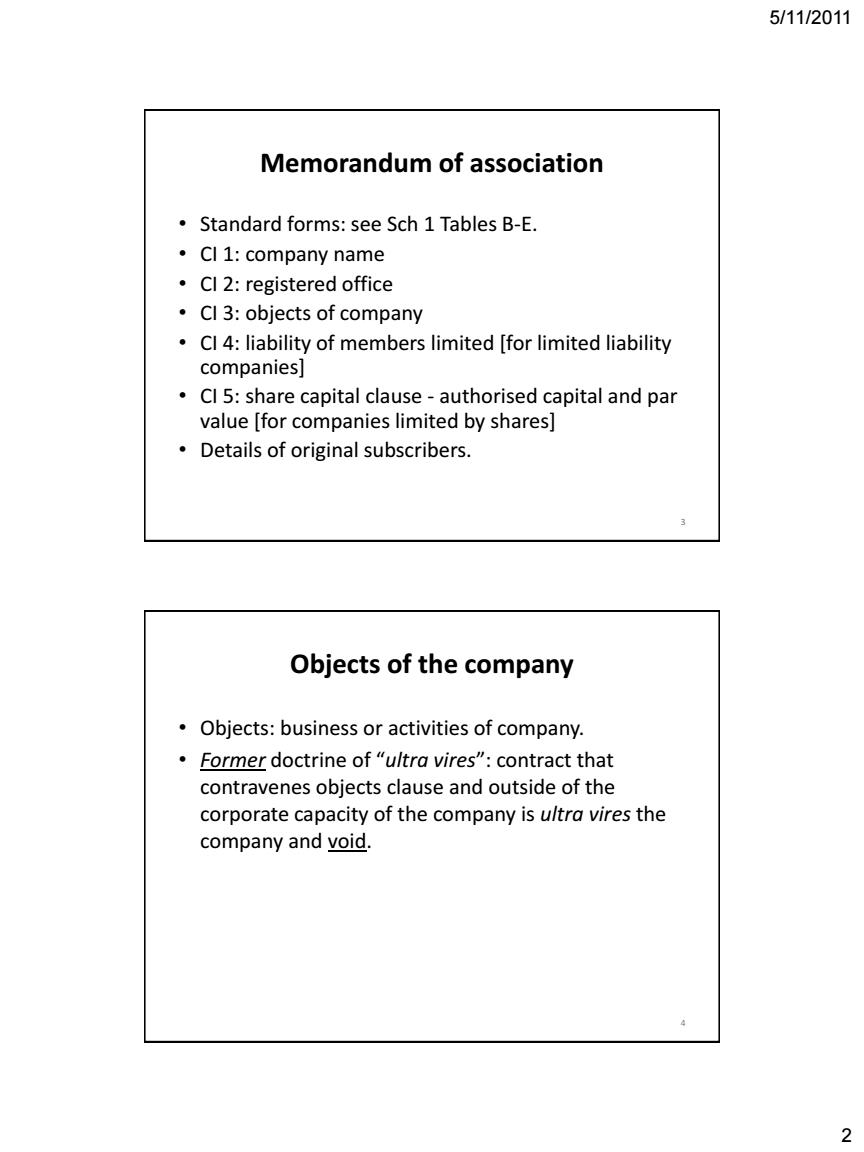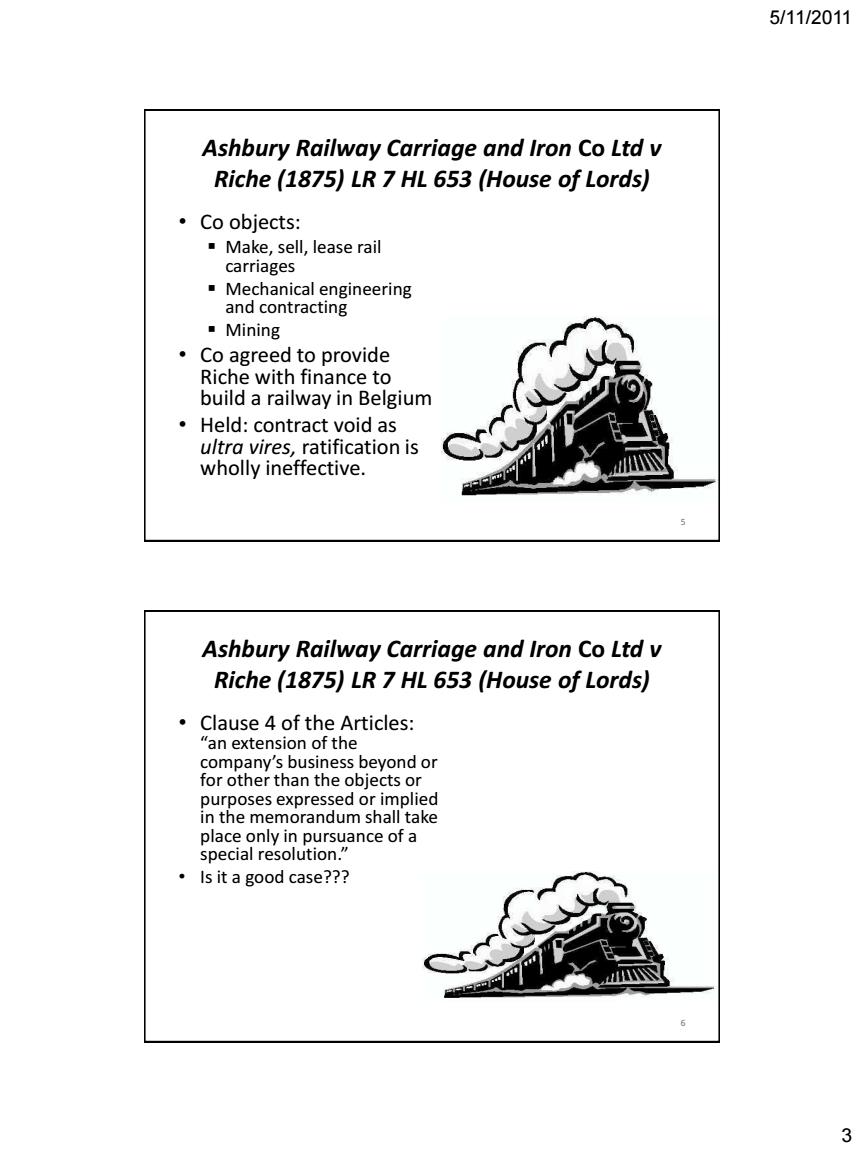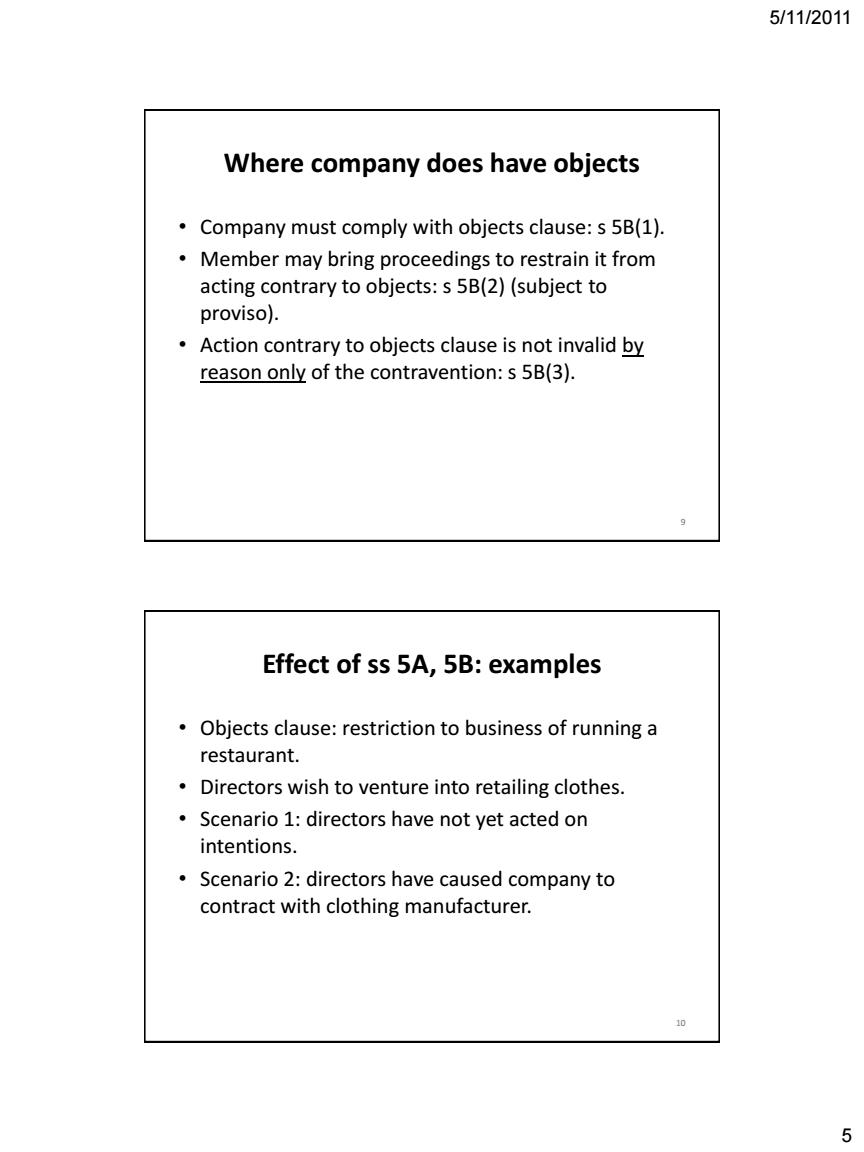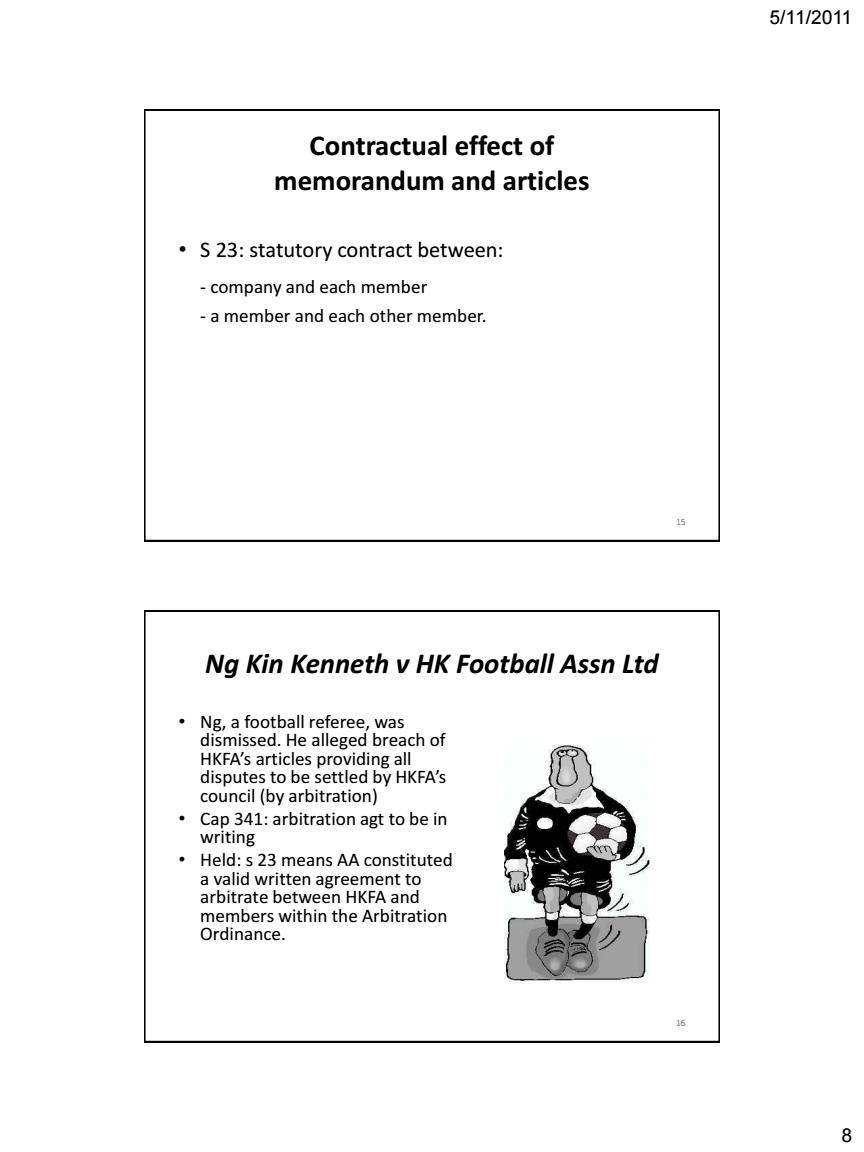
5/11/2011 Company Law I Lecture 5:Corporate Constitution Constitution ·Two documents:: ■Memorandum of Association Articles of Association 1
5/11/2011 1 1 Company Law I Lecture 5: Corporate Constitution 2 Constitution • Two documents: Memorandum of Association Articles of Association

5/11/2011 Memorandum of association Standard forms:see Sch 1 Tables B-E. ·Cl1:company name CI 2:registered office CI 3:objects of company CI 4:liability of members limited [for limited liability companies] CI 5:share capital clause-authorised capital and par value [for companies limited by shares] Details of original subscribers. Objects of the company Objects:business or activities of company. Former doctrine of "ultra vires":contract that contravenes objects clause and outside of the corporate capacity of the company is ultra vires the company and void. 2
5/11/2011 2 3 Memorandum of association • Standard forms: see Sch 1 Tables B-E. • CI 1: company name • CI 2: registered office • CI 3: objects of company • CI 4: liability of members limited [for limited liability companies] • CI 5: share capital clause - authorised capital and par value [for companies limited by shares] • Details of original subscribers. 4 Objects of the company • Objects: business or activities of company. • Former doctrine of “ultra vires”: contract that contravenes objects clause and outside of the corporate capacity of the company is ultra vires the company and void

5/11/2011 Ashbury Railway Carriage and Iron Co Ltd v Riche (1875)LR 7 HL 653 (House of Lords) ·Co objects:: Make,sell,lease rail carriages Mechanical engineering and contracting ·Mining ·Co agreed to provide Riche with finance to build a railway in Belgium Held:contract void as ultra vires,ratification is wholly ineffective. Ashbury Railway Carriage and Iron Co Ltd v Riche(1875)LR 7 HL 653 (House of Lords) Clause 4 of the Articles: "an extension of the company's business beyond or for other than the objects or purposes expressed or implied in the memorandum shall take place only in pursuance of a special resolution." ·Is it a good case?? 3
5/11/2011 3 5 Ashbury Railway Carriage and Iron Co Ltd v Riche (1875) LR 7 HL 653 (House of Lords) • Co objects: Make, sell, lease rail carriages Mechanical engineering and contracting Mining • Co agreed to provide Riche with finance to build a railway in Belgium • Held: contract void as ultra vires, ratification is wholly ineffective. 6 Ashbury Railway Carriage and Iron Co Ltd v Riche (1875) LR 7 HL 653 (House of Lords) • Clause 4 of the Articles: “an extension of the company’s business beyond or for other than the objects or purposes expressed or implied in the memorandum shall take place only in pursuance of a special resolution.” • Is it a good case???

5/11/2011 Rationale and practical effects of ultra vires doctrine Rationale of doctrine:protection of shareholders and creditors. Injustices of doctrine in practice. Circumventing the doctrine:very wide objects clauses drawn up. Abolition of ultra vires doctrine: 1997 amendments Company has capacity as a natural person:s 5A. Stating objects is optional:s 5(1A)(b). Unless members want to dispense with "Limited"in the name:s 5(1A)(a). 4
5/11/2011 4 7 Rationale and practical effects of ultra vires doctrine • Rationale of doctrine: protection of shareholders and creditors. • Injustices of doctrine in practice. • Circumventing the doctrine: very wide objects clauses drawn up. 8 Abolition of ultra vires doctrine: 1997 amendments • Company has capacity as a natural person: s 5A. • Stating objects is optional: s 5(1A)(b). - Unless members want to dispense with “Limited” in the name: s 5(1A)(a)

5/11/2011 Where company does have objects Company must comply with objects clause:s 5B(1). Member may bring proceedings to restrain it from acting contrary to objects:s 5B(2)(subject to proviso). Action contrary to objects clause is not invalid by reason only of the contravention:s 5B(3). Effect of ss 5A,5B:examples Objects clause:restriction to business of running a restaurant. Directors wish to venture into retailing clothes. Scenario 1:directors have not yet acted on intentions. Scenario 2:directors have caused company to contract with clothing manufacturer. 10 6
5/11/2011 5 9 Where company does have objects • Company must comply with objects clause: s 5B(1). • Member may bring proceedings to restrain it from acting contrary to objects: s 5B(2) (subject to proviso). • Action contrary to objects clause is not invalid by reason only of the contravention: s 5B(3). 10 Effect of ss 5A, 5B: examples • Objects clause: restriction to business of running a restaurant. • Directors wish to venture into retailing clothes. • Scenario 1: directors have not yet acted on intentions. • Scenario 2: directors have caused company to contract with clothing manufacturer

5/11/2011 Scope of s 5B(3) Difference between corporate capacity and directors' authority. Company has capacity to act outside objects clause:see s 5A. Directors do not have authority under memorandum to act outside objects clause:see s 5B(1). Company might not be bound to transaction outside objects clause if third party has notice of directors acting outside of authority. Third party will not have constructive notice of objects clause:see s 5C(partial abolition of doctrine of constructive notice). 11 Operation of ss 5B(3)and 5C:examples Scenario 3:clothing manufacturer not aware of restriction in objects clause. Scenario 4:clothing manufacturer does know of restriction in objects clause (i.e.actual notice). 12 6
5/11/2011 6 11 Scope of s 5B(3) • Difference between corporate capacity and directors’ authority. • Company has capacity to act outside objects clause: see s 5A. • Directors do not have authority under memorandum to act outside objects clause: see s 5B(1). • Company might not be bound to transaction outside objects clause if third party has notice of directors acting outside of authority. • Third party will not have constructive notice of objects clause: see s 5C (partial abolition of doctrine of constructive notice). 12 Operation of ss 5B(3) and 5C: examples • Scenario 3: clothing manufacturer not aware of restriction in objects clause. • Scenario 4: clothing manufacturer does know of restriction in objects clause (i.e. actual notice)

5/11/2011 Articles of association Regulate company's internal management. Articles registered with memorandum. Companies limited by shares: registering articles is optional. Sch 1 Table A Pt 1(public companies)and Pt 2(private companies)-default articles (see s 11). 13 Matters covered in Table A ·Capital-regs2-48. Members-regs 49-76 and 132-135. Officers-regs 77-114. Distributions and disclosure-regs 115-131. 14 7
5/11/2011 7 13 Articles of association • Regulate company’s internal management. • Articles registered with memorandum. • Companies limited by shares: - registering articles is optional. - Sch 1 Table A Pt 1 (public companies) and Pt 2 (private companies) - default articles (see s 11). 14 Matters covered in Table A • Capital - regs 2-48. • Members - regs 49-76 and 132-135. • Officers - regs 77-114. • Distributions and disclosure - regs 115-131

5/11/2011 Contractual effect of memorandum and articles S 23:statutory contract between: -company and each member a member and each other member. 15 Ng Kin Kenneth v HK Football Assn Ltd Ng,a football referee,was dismissed.He alleged breach of HKFA's articles providing all disputes to be settled by HKFA's council(by arbitration) 。 Cap 341:arbitration agt to be in writing Held:s 23 means AA constituted a valid written agreement to arbitrate between HKFA and members within the Arbitration Ordinance. 8
5/11/2011 8 15 Contractual effect of memorandum and articles • S 23: statutory contract between: - company and each member - a member and each other member. 16 Ng Kin Kenneth v HK Football Assn Ltd • Ng, a football referee, was dismissed. He alleged breach of HKFA’s articles providing all disputes to be settled by HKFA’s council (by arbitration) • Cap 341: arbitration agt to be in writing • Held: s 23 means AA constituted a valid written agreement to arbitrate between HKFA and members within the Arbitration Ordinance

5/11/2011 Member enforcing against company .Wood v Odessa Waterworks Co(1889)42 Ch D 636 (Chancery Division) Articles provided for cash dividends to be paid to shareholders,with the sanction of a general meeting of members. Co resolved in general meeting (i.e.,passing the ordinary resolution)to issue debenture-bonds instead of paying dividends. Wood sought an injunction. Held:general meeting resolution inconsistent with articles and injunction granted. 17 Company enforcing against member Hickman v Kent or Romney Marsh SheepBreeders'Association [1915]1 Ch 881(Chancery Division) Defendant is a non-profit-making co Art.49 of the Articles provided for arbitration of disputes between association and its members Hickman went to court re:irregularities in the affairs of the association Association was granted a stay of proceedings on the ground that s 33 of the Companies Act made Art.49 an agreement to arbitrate enforceable. 18 9
5/11/2011 9 17 Member enforcing against company • Wood v Odessa Waterworks Co (1889) 42 Ch D 636 (Chancery Division) Articles provided for cash dividends to be paid to shareholders, with the sanction of a general meeting of members. Co resolved in general meeting (i.e., passing the ordinary resolution) to issue debenture-bonds instead of paying dividends. Wood sought an injunction. Held: general meeting resolution inconsistent with articles and injunction granted. 18 Company enforcing against member • Hickman v Kent or Romney Marsh SheepBreeders’ Association [1915] 1 Ch 881 (Chancery Division) Defendant is a non-profit-making co Art. 49 of the Articles provided for arbitration of disputes between association and its members Hickman went to court re: irregularities in the affairs of the association Association was granted a stay of proceedings on the ground that s 33 of the Companies Act made Art. 49 an agreement to arbitrate enforceable

5/11/2011 Company enforcing against member Hickman v Kent or Romney Marsh SheepBreeders'Association [1915]1 Ch 881 (Chancery Division) "It seems clear from many authorities that shareholders as against their company can enforce and restrain breaches of its regulations...it is impossible to disregard." Astbury J:"no right merely purporting to be given by an article to a person,whether a member or not,in a capacity other than that of a member,as,for instance,a solicitor, promoter,director,can be enforced against the company." What other rules can help achieve the same result? 19 Implication of Hickman v Kent Beattie v E Beattie Ltd [1938]1 Ch 708 Case is brought by a s/er against one of the directors, Ernest Beattie (who is a s/er too) Part of the action could be stayed due to the arbitration clause(Art 133)in the articles. ■Sir Wilfred Greene MR: "[Ernest Beattie]...is not seeking to enforce a right to call on the company to arbitrate a dispute which is only accidently a dispute with himself.He is seeking,as a disputant,to have the dispute to which he is a party referred.That is sufficient to differentiate its from the right which is common to all the other members of the company under the articles." 20 10
5/11/2011 10 19 Company enforcing against member • Hickman v Kent or Romney Marsh SheepBreeders’ Association [1915] 1 Ch 881 (Chancery Division) “It seems clear from many authorities that shareholders as against their company can enforce and restrain breaches of its regulations … it is impossible to disregard.” Astbury J: “no right merely purporting to be given by an article to a person, whether a member or not, in a capacity other than that of a member, as, for instance, a solicitor, promoter, director, can be enforced against the company.” What other rules can help achieve the same result? 20 Implication of Hickman v Kent • Beattie v E Beattie Ltd [1938] 1 Ch 708 Case is brought by a s/er against one of the directors, Ernest Beattie (who is a s/er too) Part of the action could be stayed due to the arbitration clause (Art 133) in the articles. Sir Wilfred Greene MR: “*Ernest Beattie+ … is not seeking to enforce a right to call on the company to arbitrate a dispute which is only accidently a dispute with himself. He is seeking, as a disputant, to have the dispute to which he is a party referred. That is sufficient to differentiate its from the right which is common to all the other members of the company under the articles